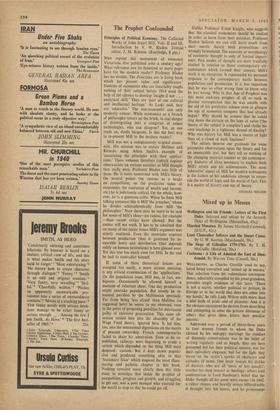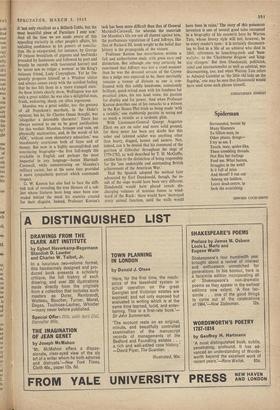Mixed up in Messes
Wellington and his Friends : Letters of the First Duke. Selected and edited by the Seventh Marshal Massena. By James MarShall-Cornwall. (0.1J.P., 42s.) Lord Chancellor Jeffreys and the Stuart Cause. By G. W. Keeton. (Macdonald, 70s.)
The Siege of Gibraltar 1779-1783. By T. H. McGuffie. (Batsford, 30s.) Cochrane : A Life of Admiral the Earl of Dun- donald. By Warren Tute. (Cassell, 36s.) WELLINGTON, as Charles Greville used to say, loved being consulted and 'mixed up in messes.' This selection from his voluminous correspon- dence, admirably compiled by his great-grandson, provides ample evidence of this taste. 'There is not a secret, whether political or private, in Europe or in the world that does not come into my hands,' he tells Lady Wilton with more than a hint both of pride and of pleasure. And it is the obvious enjoyment he derives from describing and attempting to solve the private dilemmas of others that gives these letters their peculiar interest.
Addressed over a period of thirty-three years to four women friends to whom the Duke (denied by his unhappy marriage the comfort of domestic conversation) was in the habit of writing regularly and at length, they are here presented not for their political interest, nor for their epistolary elegance, but for the light they throw on the writer's quirks of character and attitudes of mind. One letter reveals his dislike of doctors, who are all 'more or less quacks"; another his deep interest in theology: others lend confirmation to Lord Stanhope's belief that the Duke thought all his geese were swans----in 1842, a rather clumsy and heavily ornate billiard-table is brought into his house, and he pronounces
it 'not only excellent as a Billiard-Table, but the most beautiful piece of Furniture I ever saw.' And all the time we are made aware of this appealing curiosity in other people's affairs, his Unfailing confidence in his powers of concilia- tion. He is exasperated, for instance, by George IV (whose breakfasts of pigeons and beefsteaks preceded by laudanum and followed by port and brandy he records with fascinated horror) and he 'never saw so vulgar a woman' as the King's intimate friend, Lady Conyngham. Yet he fre- quently proposes himself as a Windsor visitor and always comes away with the satisfied feeling that he has left them in a 'more tranquil state.' As these letters clearly show, Wellington was not only a great soldier, he was also a delightful man, frank, endearing, sharp, yet often ingenuous.
Massena was a great soldier, too. the greatest of all Napoleon's marshals, in the Duke's opinion; but he, Sir Charles Oman thought, was 'altogether a detestable character.' There has always seemed to me to be good justification for this verdict: Massena, brusque and vain, yet physically unattractive, and, in the words of his ADC, 'without even elementary education,' was inordinately avaricious both of fame and of money. But now in a highly accomplished and convincing biography—the first full-length life available in English and perhaps the most impartial in any language—James Marshall- Cornwall, while concentrating on Massdna's military career, has at the same time provided a more sympathetic portrait which commands respect.
G. W. Keeton has also had to face the diffi- cult task of revealing the true likeness of a sub- ject whose features have long since been con- cealed behind the mask his enemies created for their disguise. Indeed, Professor Keeton's task has been more difficult than that of General Marshall-Cornwall, for whereas the materials for Massdna's life are not all slanted against him, the posthumous reputation of Lord Jeffreys, like that of Richard III, lends weight to the belief that history is the propaganda of the victors.
Professor Keeton has nevertheless written a full and authoritative study with great care and distinction. But although one may certainly be convinced that Jeffreys was less a cruel monster than he was the devoted servant of the Crown that a judge was expected to be, there inevitably remains a tremor of distaste as one is con- fronted with this coldly handsome, consciously brilliant, quick-witted man with his fondness for practical jokes, his too loud voice, his passion for display and for power. And when Professor Keeton describes one of his remarks to a witness in the Rye House Plot trials as being made 'with a twinkle,' one stubbornly persists in seeing not so much a twinkle as a sardonic glint.
With Lieutenant-General George Augustus Eliott we are on safer and more solid ground, for there never has been any doubt that this sober and talented soldier was anything other than heavy, dogged, honest and austere. Nor, indeed, can it be denied that his command of the garrison at Gibraltar throughout the siege of 1779-1783, so well described by T. H. McGuffie, entitles him to the distinction of being responsible for the 'one undeniable and outstanding British achievement of the American War.'
Had the Spanish adopted the method later advocated by Earl Dundonald, though, the re- sult of the siege would have been very different. Dundonald would have placed vessels dis- charging volumes of noxious fumes to wind- ward of the Rock: these would have 'destroyed every animal function, until the walls would
have been in ruins.' The story of this poisonous invention is one of several good tales recounted in a biography of his eccentric hero by Warren Tute, whose breezy style will not, however, be to every reader's taste: it is certainly disconcert- ing to find in a life of an admiral who died in 1860, references to launching-pads and 'base- wallahs,- to the 'Chairborne Brigade' and 'king- size clangers.' But then Dundonald, politician, rebel and internationalist as well as admiral, was disconcerting, too; and when Warren Tute refers to Admiral Gambier as 'the little old lady on the flagship,' one may be sure that Dundonald would have used some such phrase himself.
CHRISTOPHER HIBBERT



































 Previous page
Previous page